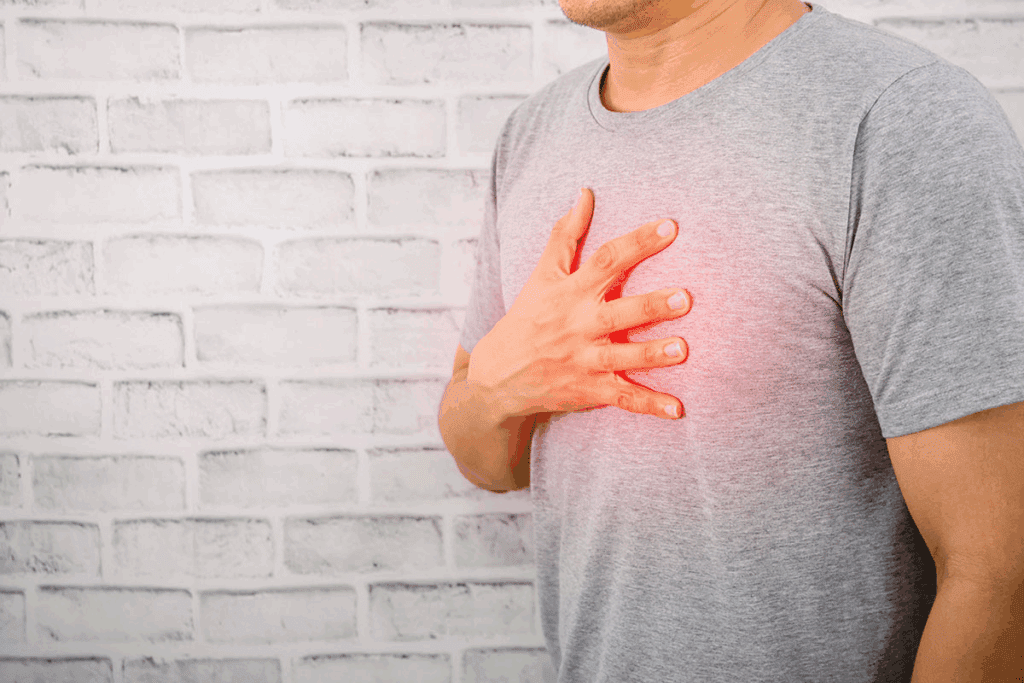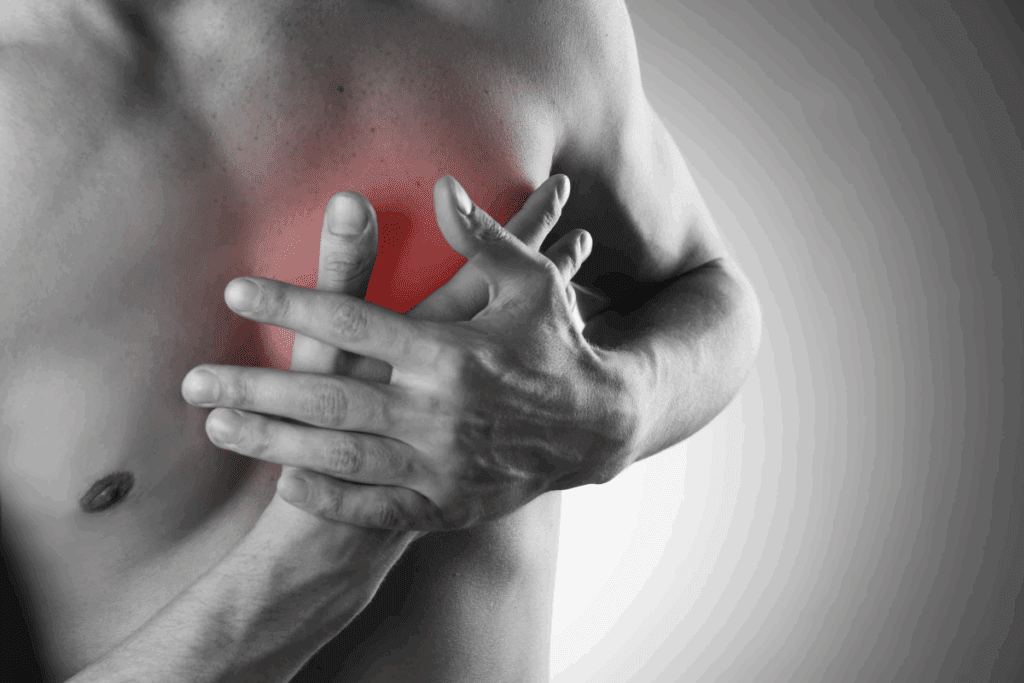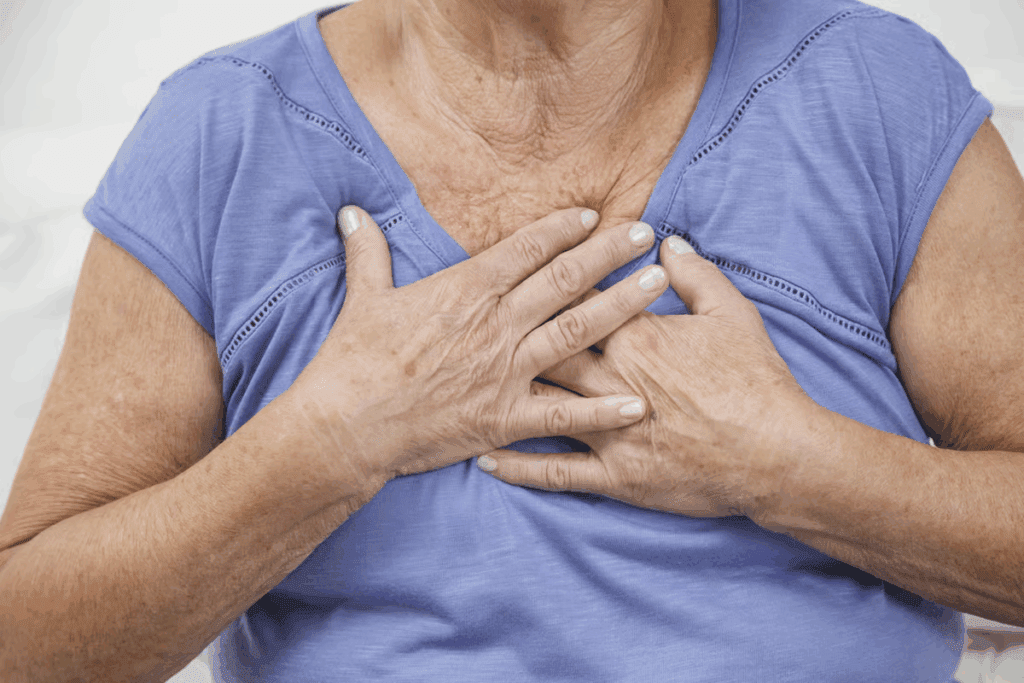Last Updated on November 25, 2025 by Ugurkan Demir

Chest pain and tightness can signal serious health issues, like heart disease. At Liv Hospital, we know stress-related chest pain often comes from both mind and body responses.
This condition worries many people, causing them discomfort.stress related chest painWhen to worry about breast pain? Knowing the symptoms and causes is the first step to managing it.

Stress can make our body’s ‘fight-or-flight’ response kick in, causing chest pain. This natural response gets ready to face or run from danger. But, if it happens often or stays on for too long, it can harm the heart and overall health.
The fight-or-flight response is a body reaction to danger. It releases stress hormones like adrenaline and cortisol. Adrenaline makes the heart beat faster and blood pressure go up, getting ready to act. Cortisol, or the “stress hormone,” affects the body in many ways, like changing metabolism and reducing non-essential functions.
Stress, whether short-term or long-term, raises these hormones. This can change the body in many ways, like a faster heart rate and higher blood pressure. While it’s meant to protect, it can wear out the heart if it happens too often.
Psychological stress can really hurt your heart health. The fight-or-flight response, always on, can lead to stress-induced heart conditions. Stress can make the heart work harder, leading to pain or symptoms that feel like a heart attack. It’s important to know the difference.
| Physiological Change | Effect on the Heart | Potential Outcome |
| Increased Heart Rate | Strains the heart muscle | Chest pain or discomfort |
| Heightened Blood Pressure | Increases the workload on the heart | Potential for heart damage over time |
| Release of Stress Hormones | Affects heart rhythm and function | Heart palpitations or arrhythmias |
Knowing how stress affects the heart is key to managing and preventing chest pain. By spotting the signs and symptoms, people can take steps to protect their heart from stress.

Stress can deeply affect our heart health, leading to various heart conditions. When we’re stressed, our body’s “fight-or-flight” response kicks in. This releases hormones like adrenaline and cortisol, affecting our heart rate and blood pressure.
Stress Cardiomyopathy, or Broken Heart Syndrome, is a heart condition linked to stress. It can cause symptoms like chest pain and irregular heart rhythms. Unlike a heart attack, it’s caused by stress hormones that temporarily stun the heart muscle.
Stress Cardiomyopathy often happens due to intense emotional or physical stress. This includes losing a loved one or experiencing a serious accident. It’s more common in women, and the heart usually recovers within days or weeks with proper treatment.
Stress can also lead to heart failure, where the heart can’t pump enough blood. Heart failure is often linked to long-term conditions. But, acute stress can trigger it in people who are already at risk.
Heart failure from stress happens when the heart is overwhelmed. This can affect people with pre-existing heart conditions or those under intense, prolonged stress.
Chronic stress can also cause other heart issues. These include:
It’s important to understand how stress affects our heart health. Recognizing signs of stress-related heart problems can help get timely medical attention. Making lifestyle changes can also help manage stress’s impact on our heart.
| Condition | Description | Symptoms |
| Stress Cardiomyopathy | A condition that mimics a heart attack, caused by a surge in stress hormones. | Chest pain, shortness of breath, irregular heart rhythms. |
| Stress-Induced Heart Failure | A condition where the heart is unable to pump enough blood due to extreme stress. | Shortness of breath, fatigue, swelling in legs. |
| Hypertension | High blood pressure that can develop or worsen with chronic stress. | Often asymptomatic, but can cause headaches, dizziness. |
Stress can show up in our bodies in many ways. One scary symptom is a sharp or stabbing pain in the chest. This pain can feel like a serious heart problem.
The pain from stress can feel sharp or stabbing. It might be sudden and intense, or it could spread across your chest. It usually happens on the left side, which can worry you about your heart.
Key features of stress-related sharp or stabbing chest pain include:
It’s important to know the difference between stress pain and a heart attack. Both can cause chest pain, but they feel and act differently. Heart attack pain feels like pressure or squeezing, often spreading to arms, back, or jaw.
Key differences include:
Knowing these differences helps you decide what to do if you have chest pain. Always get checked by a doctor to make sure it’s not a serious heart issue.
Stress can make your chest feel tight or pressured. This feeling is often linked to anxiety and stress. Knowing what causes chest tightness helps manage it and when to see a doctor.
Chest tightness feels like a squeeze or press. It might stay the same or change, sometimes getting worse. This feeling can be very uncomfortable and distressing.
Characteristics of Chest Tightness:
Many things can make chest tightness worse. These include:
| Trigger | Description |
| Stress and Anxiety | High stress and anxiety can cause physical symptoms like chest tightness. |
| Physical Activity | Doing too much physical activity can trigger or make chest tightness worse. |
| Caffeine and Stimulants | Drinking caffeine and other stimulants can make heart symptoms, like chest tightness, worse. |
Knowing what triggers chest tightness helps manage it. By understanding its causes, we can improve our heart health.
Stress can affect the heart, leading to palpitations or an irregular heartbeat. These feelings are like your heart pounding or beating in an odd way. It’s important to know why they happen to manage them well.
Palpitations can feel like a pounding or fluttering in your chest. Some people say it’s like a skipped or extra beat. You might feel it in your chest, throat, or neck. Many people get anxious about these feelings, which can make them worse.
While often harmless, palpitations can warn of serious issues. This is true if you also have chest pain, dizziness, or trouble breathing. If you have these symptoms, you should see a doctor right away.
Here are some important things to know about heart palpitations and irregular heartbeat:
If you’re worried about heart palpitations or have other symptoms, see a doctor. They can find out why you’re feeling this way and suggest treatment. Sometimes, managing stress or treating heart issues can help.
Shortness of breath is a key symptom of stress-related heart problems. It can be scary and really limit your activities. This feeling happens when you can’t catch your breath or feel winded, even when you’re sitting or doing light activities.
Shortness of breath is often tied to anxiety and panic attacks. Stress triggers our “fight or flight” response, causing us to breathe fast. This can make us feel like we can’t breathe, which can make anxiety and panic worse.
It’s important to know that shortness of breath can be a sign of serious heart issues. But it’s also common in anxiety disorders. Knowing this can help us manage the symptom better.
There are breathing techniques that can help with shortness of breath caused by stress and anxiety. Diaphragmatic breathing, or belly breathing, is very helpful. It involves breathing deeply into your lungs, using your diaphragm, not just your chest.
Other methods like paced breathing and box breathing can also help. They can make your breathing more regular and reduce shortness of breath. Doing these exercises often can help manage stress-related breathing issues.
Stress can cause heart pain that spreads to the arms, jaw, or back. This pain is often linked to heart problems like heart attacks. It can also show up in people with stress-related heart issues. Knowing how this pain acts is key to figuring out what to do next.
Pain from stress can go to different parts of the body. It often hits the arms, the jaw, and the back. This happens because of the way nerves send pain signals to the brain. The pain can feel like a dull ache or a sharp stab.
Medical Expert, a cardiologist, says, “Pain that spreads is a warning sign for the heart. It’s not just chest pain; it’s about where the pain goes.”
“The heart and brain are closely linked, and stress can manifest in various ways, including radiating pain.”
To tell stress pain from heart problems, look at the whole picture. Stress pain can change and might come with other signs like rapid heartbeat or sweating.
But, it’s always better to be safe. If the pain is bad, lasts a long time, or comes with other scary signs, get help right away.
Stress can affect the heart in unexpected ways, like excessive sweating and hot flashes. These symptoms can be very upsetting and affect daily life. It’s important to understand how they relate to stress related heart pain to manage them better.
Excessive sweating and hot flashes are our body’s stress response. They happen because of the “fight-or-flight” response. Stress hormones like adrenaline get released, preparing our body to face or flee from danger.
This can cause blood vessels to widen, making us feel hot, or experience hot flashes. It also triggers sweat glands, leading to excessive sweating. While these symptoms can happen without heart problems, they’re concerning when linked to heart stress symptoms.
Excessive sweating and hot flashes often come with other symptoms. These can signal stress induced heart failure or other heart issues. Some common symptoms include:
It’s important to recognize these symptoms and their link to stress related heart pain. If you notice these signs, seek medical help. This is to check for any serious health problems.
Reducing stress is key to easing these symptoms. Deep breathing, meditation, and exercise can help lower stress. A healthy lifestyle, including a balanced diet and enough sleep, also supports heart health.
Stress can also cause fatigue, dizziness, and digestive issues. These symptoms might not seem directly related to heart problems. Yet, they can greatly affect a person’s life and health.
Feeling tired all the time is a sign of stress on the heart. It’s not just being tired after a long day. It’s feeling exhausted even after resting.
Characteristics of Stress-Induced Fatigue:
A study in the Journal of the American Heart Association found that fatigue is common in heart failure. It’s linked to worse outcomes.
“Fatigue is a complex symptom that can have a significant impact on a patient’s quality of life,” the study notes.
Dizziness and feeling lightheaded can be signs of heart stress. These feelings can be mild or severe. Sometimes, you might feel like everything around you is spinning.
| Symptom | Description | Possible Causes |
| Lightheadedness | Feeling faint or about to pass out | Reduced blood flow to the brain |
| Vertigo | Sensation of spinning or movement | Inner ear issues or stress-induced |
Nausea and stomach pain can also be signs of heart stress. These symptoms can be hard to diagnose because they can look like other problems.
These symptoms can be very upsetting and affect your daily life. It’s important to understand how stress, heart health, and these symptoms are connected. This knowledge helps in managing and treating them effectively.
It’s key to know the difference between stress heart attack symptoms and real heart attacks. Stress heart attack symptoms can look a lot like real heart attacks. This makes it hard to tell what’s happening without a doctor’s check-up.
Both stress heart attack symptoms and real heart attacks can cause chest pain and shortness of breath. But, they have different reasons behind them. Real heart attacks happen when a blockage in the heart’s arteries cuts off blood flow. Stress heart attack symptoms, on the other hand, are caused by how the body reacts to extreme stress, which can temporarily affect heart function.
Knowing when to call for help is very important. If you have severe chest pain, trouble breathing, or pain in your arms, jaw, or back, call 911 right away. These signs could mean you’re having a heart attack, and quick medical help is vital.
If you’re not sure if your symptoms are from stress or a heart problem, it’s safer to get medical help. Better safe than sorry.
When you get to the hospital, doctors will run tests to figure out what’s going on. They might do:
These tests help doctors tell if your symptoms are from stress or a real heart problem. This guides the right treatment and care for you.
It’s important to know the signs and reasons behind stress-related heart pain. We’ve talked about different heart issues linked to stress, like stress cardiomyopathy. These can really affect your heart’s health.
To deal with stress-related heart pain, we suggest a full plan. This includes managing stress, making lifestyle changes, and getting medical help. Practices like meditation and deep breathing can help ease symptoms.
Preventing stress-related heart pain is also vital. A healthy lifestyle, like regular exercise and a balanced diet, can lower your risk. If symptoms don’t go away or get worse, see a doctor right away.
By managing stress and preventing heart issues, you can feel better and lower your risk of heart problems. This includes avoiding stress cardio myopathy and other heart pain linked to stress.
Stress cardiomyopathy, also known as broken heart syndrome, is a heart condition. It happens when extreme emotional or physical stress weakens the heart muscle. This can cause symptoms like a heart attack, but without blocked coronary arteries.
Yes, stress can lead to heart pain. When we’re stressed, our body’s fight-or-flight response kicks in. This releases stress hormones like adrenaline and cortisol. These hormones can make our heart rate and blood pressure go up, causing chest pain or discomfort.
Symptoms of stress-induced heart failure include shortness of breath and fatigue. You might also notice swelling in your legs and feet, or a rapid or irregular heartbeat. If you’re experiencing these symptoms, it’s important to see a doctor.
Stress-related chest pain can feel sharp or stabbing. Heart attack pain is often described as a crushing or squeezing feeling. If you’re unsure, it’s best to get medical help.
Chest tightness and pressure can be caused by stress, anxiety, and panic. Caffeine, nicotine, or certain medications can also trigger these symptoms.
If heart palpitations come with dizziness, chest pain, or shortness of breath, seek help right away. If you’re worried about palpitations, talk to your healthcare provider.
Yes, techniques like deep breathing, diaphragmatic breathing, or yoga can help with shortness of breath caused by stress and anxiety.
Anxiety can lead to hyperventilation, causing shortness of breath. When we’re anxious, our breathing becomes shallow and rapid. This can lead to respiratory alkalosis and worsen symptoms.
To manage stress-related heart pain, try stress-reducing techniques like meditation, yoga, or deep breathing. Also, maintain a healthy lifestyle with a balanced diet, regular exercise, and enough sleep.
Tests like electrocardiograms (ECGs), echocardiograms, stress tests, or cardiac biomarkers may be used. Your healthcare provider will decide which tests you need based on your situation.
Broken heart syndrome is usually reversible but can be serious. It can lead to complications like heart failure or arrhythmias. Getting medical help quickly is important if you’re experiencing symptoms.
Yes, chronic stress can lead to heart conditions like cardiomyopathy or heart failure. Managing stress through lifestyle changes and stress-reducing techniques is key for heart health.
Subscribe to our e-newsletter to stay informed about the latest innovations in the world of health and exclusive offers!